人教精通版六年级英语上册
- 格式:docx
- 大小:20.56 KB
- 文档页数:2
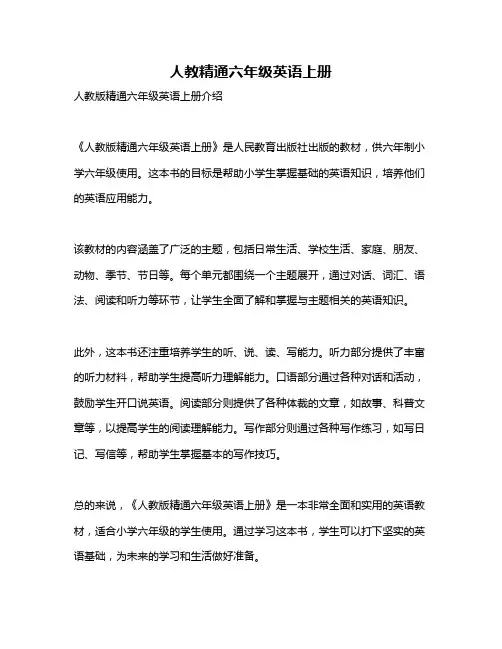
人教精通六年级英语上册
人教版精通六年级英语上册介绍
《人教版精通六年级英语上册》是人民教育出版社出版的教材,供六年制小学六年级使用。
这本书的目标是帮助小学生掌握基础的英语知识,培养他们的英语应用能力。
该教材的内容涵盖了广泛的主题,包括日常生活、学校生活、家庭、朋友、动物、季节、节日等。
每个单元都围绕一个主题展开,通过对话、词汇、语法、阅读和听力等环节,让学生全面了解和掌握与主题相关的英语知识。
此外,这本书还注重培养学生的听、说、读、写能力。
听力部分提供了丰富的听力材料,帮助学生提高听力理解能力。
口语部分通过各种对话和活动,鼓励学生开口说英语。
阅读部分则提供了各种体裁的文章,如故事、科普文章等,以提高学生的阅读理解能力。
写作部分则通过各种写作练习,如写日记、写信等,帮助学生掌握基本的写作技巧。
总的来说,《人教版精通六年级英语上册》是一本非常全面和实用的英语教材,适合小学六年级的学生使用。
通过学习这本书,学生可以打下坚实的英语基础,为未来的学习和生活做好准备。
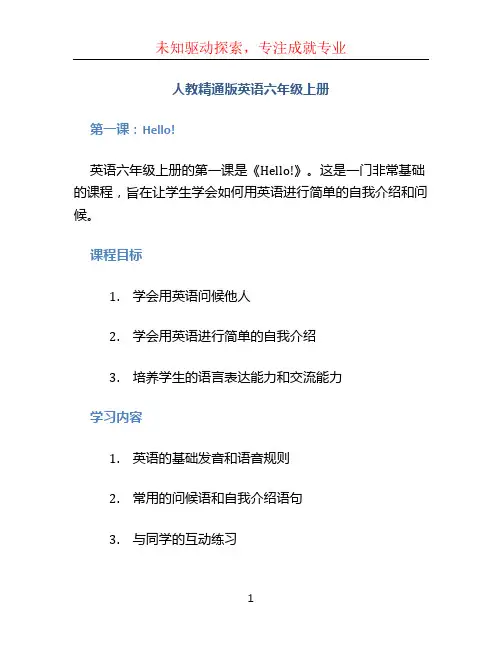
人教精通版英语六年级上册第一课:Hello!英语六年级上册的第一课是《Hello!》。
这是一门非常基础的课程,旨在让学生学会如何用英语进行简单的自我介绍和问候。
课程目标1.学会用英语问候他人2.学会用英语进行简单的自我介绍3.培养学生的语言表达能力和交流能力学习内容1.英语的基础发音和语音规则2.常用的问候语和自我介绍语句3.与同学的互动练习学习重点1.学会正确发音英语字母及单词2.学会正确使用常见的问候语和自我介绍语句3.学会主动与同学进行英语练习学习方法1.多听多模仿,在课后做听力练习2.多与同学合作,进行口语对话练习3.利用课余时间积累词汇量,提高语言表达能力课后作业1.背诵并默写对话内容2.与同学进行英语对话练习3.制作一张问候卡片送给任意一位同学第二课:My Family英语六年级上册的第二课是《My Family》。
这节课主要讲述了家庭成员的称呼以及家庭成员间关系的简单介绍。
课程目标1.学习家庭成员的称呼并能够正确运用2.学习简单的家庭成员关系词汇3.培养学生对家庭的关注和热爱学习内容1.家庭成员的称呼2.家庭成员关系的名词3.家庭成员关系的表达学习重点1.掌握家庭成员的常用称呼2.学会使用与家庭成员关系有关的词汇3.学会用英语进行简单的家庭成员关系介绍学习方法1.制定记忆计划,背诵并默写家庭成员的称呼2.结合图片和口头表达练习,加深对家庭成员关系的理解3.同学之间小组合作,进行家庭成员关系的对话练习课后作业1.默写家庭成员关系的常用词汇2.配合图片,给家庭成员进行简单的自我介绍3.与同学分享自己的家庭成员关系第三课:My School英语六年级上册的第三课是《My School》。
这节课主要介绍了学校的各个场所和学校的一些基本情况。
课程目标1.学习学校各个场所的名称2.学习描述学校的一些基本情况3.培养学生对学校的归属感和热爱学习内容1.学校各个场所的名称2.学校的基本情况介绍3.学校场所与活动的相关表达学习重点1.掌握学校各个场所的英文名称2.学会描述学校的一些基本情况3.学会用英语进行学校场所的简单描述学习方法1.多看多模仿,熟悉学校场所的英文名称2.制定记忆计划,默写学校场所名称3.进行小组活动,用英语描述学校场所和活动课后作业1.默写学校场所的英文名称2.结合图片,用英语描述自己喜欢的学校场所3.与同学分享自己最喜欢的学校场所第四课:My Hobbies英语六年级上册的第四课是《My Hobbies》。

最新人教精通版小学六年级上册英语教案(全册-共80页)-CAL-FENGHAI-(2020YEAR-YICAI)_JINGBIAN人教精通版小学六年级上册英语教案课题:Unit1 I go to school at 8:00.课题:Unit1 I go to school at 8:00.Lesson 2课题:Unit1 I go to school at 8:00.课题:Unit1 I go to school at 8:00.课题:Unit1 I go to school at 8:00.课题:Unit1 I go to school at 8:00.课题:Unit 2 What’s your hobby?Lesson 7课题:Unit 2 What’s your hobby?课题:Unit 2 What’s your hobby?课题:Unit 2 What’s your hobby?课题:Unit 2 What’s your hobby?课题:Unit 2 What’s your hobby?Lesson 12课题:Unit3 Would you like to come to my birthday party?课题:Unit3 Would you like to come to my birthday party?课题:Unit3 Would you like to come to my birthday party?一边展示十二个生肖图片及单词,一边做Let's do: Act like a..... (引入12生肖,指导学生了解其中几个12生肖的生词)2. Presentation (15′)1)指导学生制作生日邀请卡。
2)学习短语invite your friends to your party, celebrate your birthday with your friends, give a birthday card to your friend.3)运用邀请卡练习会话:Would you like to come to my birthday partySure. I’d love to. Here’s a card for you! Thank you! Goodbye!/ Bye-bye!/ Bye!4)Listen and repeat.T: Listen to the tape and then read after it.5)Just write.T wrtie Four Skills’ words and sentences on blackboard, ask Ss to follow.6)Let’s read and chant:播放Let's read and chant部分的录音两遍。
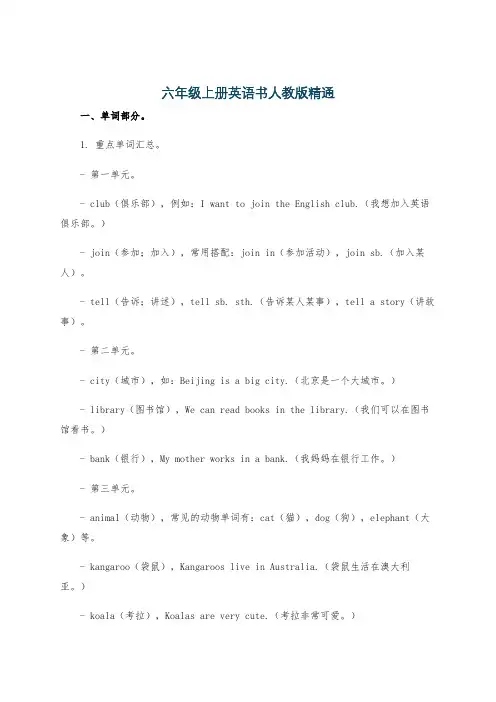
六年级上册英语书人教版精通一、单词部分。
1. 重点单词汇总。
- 第一单元。
- club(俱乐部),例如:I want to join the English club.(我想加入英语俱乐部。
)- join(参加;加入),常用搭配:join in(参加活动),join sb.(加入某人)。
- tell(告诉;讲述),tell sb. sth.(告诉某人某事),tell a story(讲故事)。
- 第二单元。
- city(城市),如:Beijing is a big city.(北京是一个大城市。
)- library(图书馆),We can read books in the library.(我们可以在图书馆看书。
)- bank(银行),My mother works in a bank.(我妈妈在银行工作。
)- 第三单元。
- animal(动物),常见的动物单词有:cat(猫),dog(狗),elephant(大象)等。
- kangaroo(袋鼠),Kangaroos live in Australia.(袋鼠生活在澳大利亚。
)- koala(考拉),Koalas are very cute.(考拉非常可爱。
)- 第四单元。
- hobby(爱好),My hobby is painting.(我的爱好是绘画。
)- reading(阅读),He likes reading books.(他喜欢读书。
)- dancing(跳舞),She is good at dancing.(她擅长跳舞。
)- 第五单元。
- country(国家),China is a great country.(中国是一个伟大的国家。
)- Australia(澳大利亚),There are many unique animals in Australia.(澳大利亚有很多独特的动物。
)- Canada(加拿大),Canada is famous for its maple leaves.(加拿大以枫叶闻名。
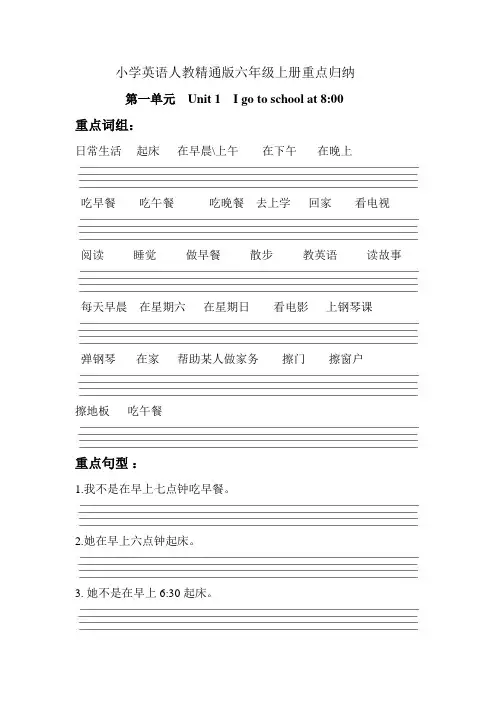
小学英语人教精通版六年级上册重点归纳第一单元Unit 1 I go to school at 8:00重点词组:日常生活起床在早晨\上午在下午在晚上吃早餐吃午餐吃晚餐去上学回家看电视阅读睡觉做早餐散步教英语读故事每天早晨在星期六在星期日看电影上钢琴课弹钢琴在家帮助某人做家务擦门擦窗户擦地板吃午餐重点句型:1.我不是在早上七点钟吃早餐。
2.她在早上六点钟起床。
3. 她不是在早上6:30起床。
4.凯特在周六做什么?5. 她通常弹钢琴。
6.我在7:30吃早饭。
7.我在12:00吃午饭。
8.我在6:00吃晚餐。
9.你在周六干什么?10.我经常去看电影。
第二单元Unit 2 What's your hobby? 重点词组:1. 一辆新的玩具汽车2. 看一看3. 收集玩具汽车4. 收集邮票5.收集地图6. 收集卡片7. 看8. 种花9. 喝中国茶10. 去钓鱼11. 做饭12. 对……感兴趣13. 做布娃娃14. 玩电脑游戏15. 照相16.照顾好17. 谈论18.打篮球19. 寻找20. 在冬天21. 从……到……22. 在夜间23. 在世界上重点句型:1. 你爷爷的爱好是什么?2. 他的爱好是钓鱼。
3. 你对什么感兴趣?4.我对拍照感兴趣。
5. 你的爱好是什么?6. 我的爱好是收集地图。
6. 你爸爸的爱好是什么?7. 他的爱好是种花。
第三单元Unit 3 Would you like to come to my birthday party?重点词组:生日聚会放学后邀请卡邀请朋友参加聚会与朋友庆祝生日向朋友赠送生日贺卡星形蛋糕心形蛋糕水果派\水果馅饼点蜡烛唱生日歌许愿吹蜡烛切蛋糕吃蛋糕一块蛋糕重点句型:1. 你想要什么种类的蛋糕?2.我想要一个心形的蛋糕。
3. 他们怎么庆祝生日的?4. 首先,他们点燃蜡烛,然后……5.你愿意来我的生日晚会吗?6. 当然,我愿意。
7. 再见。
8.我能吃些冰激凌吗?9. 这个生日蛋糕师送给你的。
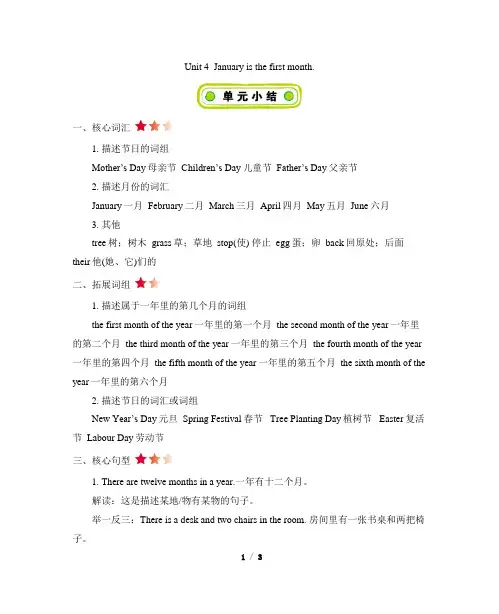
Unit 4 January is the first month.一、核心词汇1. 描述节日的词组Mother’s Day母亲节Children’s Day儿童节Father’s Day父亲节2. 描述月份的词汇January一月 February二月 March三月 April四月 May五月 June六月3. 其他tree树;树木 grass草;草地 stop(使) 停止 egg蛋;卵 back回原处;后面their他(她、它)们的二、拓展词组1. 描述属于一年里的第几个月的词组the first month of the year一年里的第一个月 the second month of the year一年里的第二个月 the third month of the year一年里的第三个月 the fourth month of the year 一年里的第四个月 the fifth month of the year一年里的第五个月 the sixth month of the year一年里的第六个月2. 描述节日的词汇或词组New Year’s Day元旦 Spring Festival春节 Tree Planting Day植树节 Easter复活节 Labour Day劳动节三、核心句型1. There are twelve months in a year.一年有十二个月。
解读:这是描述某地/物有某物的句子。
举一反三:There is a desk and two chairs in the room. 房间里有一张书桌和两把椅子。
2. January is the first month.一月是第一个月。
解读:这是一个描述某月是第几个月的句子。
举一反三:February is the second month. 二月是第二个月。
3. The first day, January 1st, is called New Year’s Day. 第一天,1月1日,被叫作元旦。
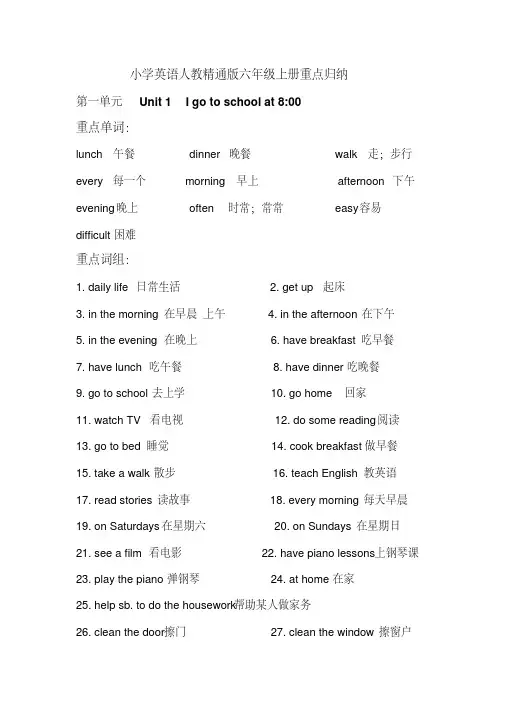
小学英语人教精通版六年级上册重点归纳第一单元Unit 1 I go to school at 8:00重点单词:lunch 午餐dinner 晚餐walk 走;步行every 每一个morning 早上afternoon 下午evening 晚上often 时常;常常easy 容易difficult困难重点词组:1. daily life 日常生活2. get up 起床3. in the morning 在早晨上午4. in the afternoon 在下午5. in the evening 在晚上6. have breakfast 吃早餐7. have lunch 吃午餐8. have dinner 吃晚餐9. go to school 去上学10. go home 回家11. watch TV 看电视12. do some reading 阅读13. go to bed 睡觉14. cook breakfast 做早餐15. take a walk 散步16. teach English 教英语17. read stories 读故事18. every morning 每天早晨19. on Saturdays 在星期六20. on Sundays 在星期日21. see a film 看电影22. have piano lessons 上钢琴课23. play the piano 弹钢琴24. at home 在家25. help sb. to do the housework 帮助某人做家务26. clean the door 擦门27. clean the window 擦窗户28. clean the floor 擦地板重点句型:have breakfast at 7:00 in the morning . 我不是在早上七点钟吃1.I don’t早餐。
2.She gets up at 6:00 in the morning . 她在早上六点钟起床。
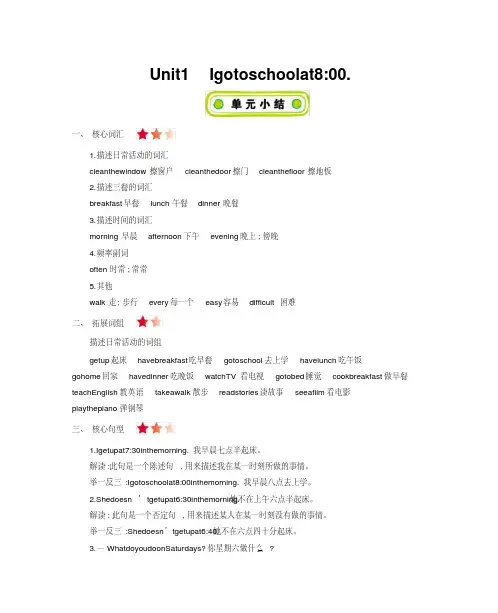
Unit1Igotoschoolat8:00.一、核心词汇1.描述日常活动的词汇cleanthewindow擦窗户cleanthedoor擦门cleanthefloor擦地板2.描述三餐的词汇breakfast早餐lunch午餐dinner晚餐3.描述时间的词汇morning早晨afternoon下午evening晚上; 傍晚4.频率副词often时常; 常常5.其他walk走; 步行every每一个easy容易difficult困难二、拓展词组描述日常活动的词组getup起床havebreakfast吃早餐gotoschool去上学havelunch吃午饭gohome回家havedinner吃晚饭watchTV看电视gotobed睡觉cookbreakfast做早餐teachEnglish教英语takeawalk散步readstories读故事seeafilm看电影playthepiano弹钢琴三、核心句型1.Igetupat7:30inthemorning. 我早晨七点半起床。
解读:此句是一个陈述句, 用来描述我在某一时刻所做的事情。
举一反三:Igotoschoolat8:00inthemorning. 我早晨八点去上学。
她不在上午六点半起床。
2.Shedoesn’tgetupat6:30inthemorning.解读: 此句是一个否定句, 用来描述某人在某一时刻没有做的事情。
举一反三:Shedoesn’tgetupat6:40.她不在六点四十分起床。
3.— WhatdoyoudoonSaturdays? 你星期六做什么?— Ioftengoandseeafilmwithmyparents. 我经常和我的父母一起去看电影。
解读:这是用来询问对方某天做什么及其回答的句子。
举一反三:— Whatdoyoudoontheweekend? 你周末做什么?— Ioftendohomework. 我经常做作业。

小学英语人教精通版六年级上册重点归纳第一单元Unit 1 重点单词:lunch 午餐every 每一个evening 晚上difficult困难重点词组:1. daily life 日常生活3. in the morning 在早晨上午5. in the evening 在晚上7. have lunch 吃午餐walk 走;步行afternoon 下午easy容易2. get up 起床4. in the afternoon 在下午6. have breakfast 吃早餐8. have dinner 吃晚餐10. go home 回家12. do some reading 阅读14. cook breakfast 做早餐16. teach English 教英语18. every morning 每天早晨20. on Sundays 在星期日22. have Pia no IeSS OnS 上钢琴课24. at home 在家25. help sb. to do the housework帮助某人做家务26. clea n the door扌察门27. clean the window 擦窗户I go to school at 8:00dinner 晚餐morning 早上often时常;常常9. go to school 去上学11. watch TV 看电视13. go to bed 睡觉15. take a walk 散步17. read stories 读故事19. on Saturdays 在星期六21. see a film 看电影23. play the piano 弹钢琴28. clean the floor 擦地板重点句型:1.I don'h t ave breakfast at 7:00 in the morning .我不是在早上七点钟吃早餐。
2.She gets up at 6:00 in the morning 她. 在早上六点钟起床。
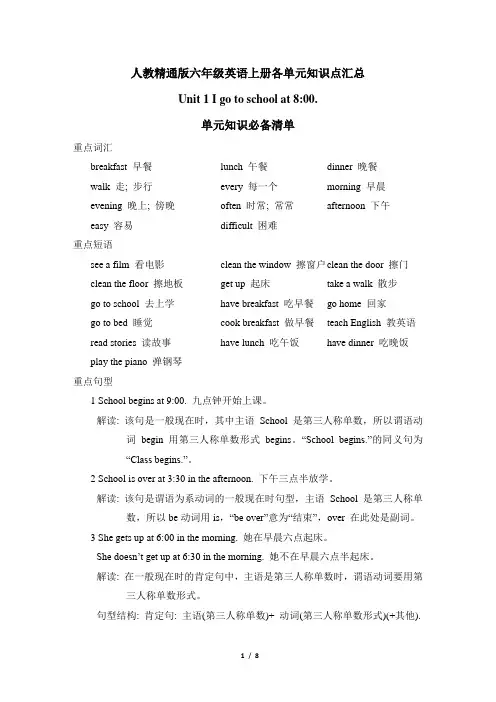
人教精通版六年级英语上册各单元知识点汇总Unit 1 I go to school at 8:00.单元知识必备清单重点词汇breakfast 早餐lunch 午餐dinner 晚餐walk 走; 步行every 每一个morning 早晨evening 晚上; 傍晚often 时常; 常常afternoon 下午easy 容易difficult 困难重点短语see a film 看电影clean the window 擦窗户c lean the door 擦门clean the floor 擦地板get up 起床take a walk 散步go to school 去上学have breakfast 吃早餐go home 回家go to bed 睡觉cook breakfast 做早餐teach English 教英语read stories 读故事have lunch 吃午饭have dinner 吃晚饭play the piano 弹钢琴重点句型1 School begins at 9:00. 九点钟开始上课。
解读: 该句是一般现在时,其中主语School 是第三人称单数,所以谓语动词begin 用第三人称单数形式begins。
“School begins.”的同义句为“Class begins.”。
2 School is over at 3:30 in the afternoon. 下午三点半放学。
解读: 该句是谓语为系动词的一般现在时句型,主语School 是第三人称单数,所以be动词用is,“be over”意为“结束”,over 在此处是副词。
3 She gets up at 6:00 in the morning. 她在早晨六点起床。
She doesn’t get up at 6:30 in the morning. 她不在早晨六点半起床。
解读: 在一般现在时的肯定句中,主语是第三人称单数时,谓语动词要用第三人称单数形式。
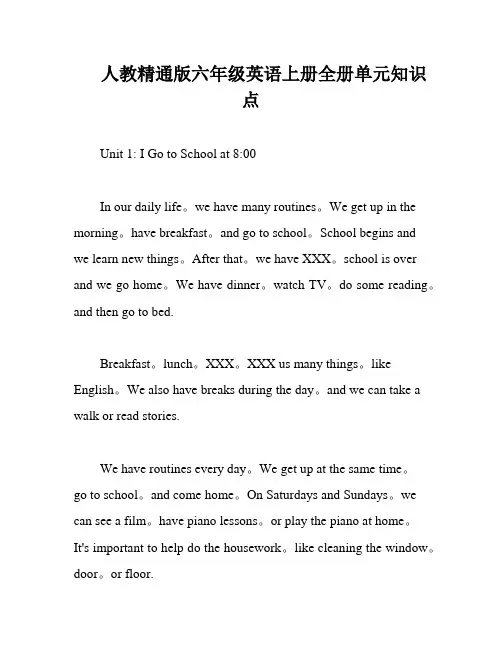
人教精通版六年级英语上册全册单元知识点Unit 1: I Go to School at 8:00In our daily life。
we have many routines。
We get up in the morning。
have breakfast。
and go to school。
School begins andwe learn new things。
After that。
we have XXX。
school is over and we go home。
We have dinner。
watch TV。
do some reading。
and then go to bed.Breakfast。
lunch。
XXX。
XXX us many things。
like English。
We also have breaks during the day。
and we can take a walk or read stories.We have routines every day。
We get up at the same time。
go to school。
and come home。
On Saturdays and Sundays。
we can see a film。
have piano lessons。
or play the piano at home。
It's important to help do the housework。
like cleaning the window。
door。
or floor.In summary。
our daily life is full of routines and activities。
Some are easy。
while others are difficult。
but they all help us grow and learn.Unit 2 What's Your Hobby?Do you have any hobbies。
六年级上册人教精通版一、重点单词。
1. 地点类。
- library [ˈlaɪbrəri] 图书馆。
- post office [pəust ˈɔ:fis] 邮局。
- hospital [ˈhɔspitl] 医院。
- cinema [ˈsinəmə] 电影院。
- bookstore [ˈbukstɔ:] 书店。
- science museum [ˈsaiəns mju:ˈziəm] 科学博物馆。
2. 方位介词类。
- near [niə] 在……附近。
- next to [nekst tu:] 紧挨着。
- in front of [in frʌnt ɔv] 在……前面。
二、重点句型。
1. 询问地点及回答。
- Where is the library? 图书馆在哪里?- It's near the post office. 它在邮局附近。
2. 描述位置关系。
- The hospital is next to the cinema. 医院紧挨着电影院。
- There is a bookstore in front of the science museum. 在科学博物馆前面有一个书店。
三、语法点。
1. there be句型。
- 概念:表示“某地有某物”。
- 结构:There is + 单数可数名词/不可数名词+地点状语.- 例如:There is a park in my neighborhood.- There are+复数可数名词+地点状语.- 例如:There are some trees in the park.- 就近原则:当有多个并列主语时,be动词的形式取决于离它最近的主语的单复数形式。
- 例如:There is a book and two pens on the desk.(离be动词最近的是a book,为单数,所以用is)- There are two pens and a book on the desk.(离be动词最近的是two pens,为复数,所以用are)2. 方位介词的用法。
人教精通版六年级上册英语单词及句子英 [ɡet ʌp] / 起床When do you get up every day?(你每天什么时候起床?)·have breakfast英 [hæv ˈbrekfəst] / 吃早餐They are going to have breakfast.(他们要吃早饭了。
)·go to school英 [ɡəu tu: sku:l] / 去上学I go to school at 7:00.(我七点钟去上学。
)·School begins英 / 开始上课School begins at eight.(八点钟上课。
)·have lunch英 / 吃午饭It''s time to have lunch!(午饭的时间到了!)·School is over英 / 放学I''m elated that school is over.(放学了,我很兴奋。
)·go home英 [ɡəu həum] / 回家I go home at 17:00.(我17点回家。
)·have dinner英 / 吃晚饭Would you like to stay and have dinner?(你留下来一起吃饭好吗?)·watch TV英 [wɔtʃ ˈti:ˈvi:] / 看电视Do you always watch TV in the evening?(你晚上总看电视吗?)·go to bed英 [ɡəu tu: bed] / 睡觉I go to bed at 21:00.(我21:00睡觉。
)·breakfast英 [ˈbrekfəst] / n.早餐What''s for breakfast?(早餐吃什么?)·lunch英 [lʌntʃ] / n.午餐We had an exceedingly good lunch.(我们吃了一顿极为丰盛的午餐。
人教精通版六年级上册英语Unit 1: GreetingsIn this unit, students learn about different greetings in English. They practice saying "hello," "hi," "goodbye," and "see you" to greet and say goodbye to people. They also learn the importance of using polite language when greeting others.Unit 2: NumbersIn this unit, students learn numbers from 0 to 100. They practice counting, identifying numbers, and doing basic math operations, such as addition and subtraction, with these numbers.Unit 3: School LifeIn this unit, students learn vocabulary related to school life, such as subjects, school supplies, and activities. Theyalso learn to talk about their daily routines, express likes and dislikes, and ask questions about others' school life.Unit 4: FamilyIn this unit, students learn vocabulary related to family members, such as parents, siblings, and grandparents. They practice using possessive pronouns to describe family relationships and talk about activities they do with their family members.Unit 5: Holidays and TraditionsIn this unit, students learn about different holidays and traditions celebrated around the world. They learn vocabulary related to holidays, such as Christmas, Chinese New Year, and Thanksgiving. They also learn about the customs andtraditions associated with these holidays.Unit 6: Weather and Seasonsweather and seasons, such as sunny, rainy, winter, and summer. They practice describing the weather and talking about their favorite seasons and outdoor activities.Unit 7: AnimalsIn this unit, students learn vocabulary related to animals, such as pets, farm animals, and wild animals. They practice describing animals' characteristics and habitats, as well as talking about their favorite animals.Unit 8: Food and DrinksIn this unit, students learn vocabulary related to food and drinks, such as fruits, vegetables, snacks, and beverages. They practice expressing food preferences, ordering food in a restaurant, and talking about healthy eating habits.Unit 9: Hobbies and Sportshobbies, sports, and leisure activities. They practicetalking about their hobbies, expressing likes and dislikes, and describing different sports and activities they enjoy.Unit 10: Colors and ClothesIn this unit, students learn vocabulary related to colors and clothes. They practice identifying and describing different colors, as well as talking about their favorite clothes and dressing up for different occasions.Unit 11: Places in the CityIn this unit, students learn vocabulary related to places in the city, such as parks, libraries, and hospitals. They practice giving and following directions, as well as talking about activities they can do in different places.Unit 12: Daily LifeIn this unit, students learn vocabulary related to daily life activities, such as waking up, brushing teeth, and doing homework. They practice talking about their daily routines and expressing time using "o'clock" and "half past."Remember, this is just an overview of the topics covered in the textbook. For a complete understanding and comprehensive study, it is advisable to consult the entire textbook.。
六年级上册人教精通版英语一、单词。
1. 重点单词汇总。
- 描述人物外貌和性格的单词。
- tall(高的),short(矮的;短的),fat(胖的),thin(瘦的),strong (强壮的),kind(和蔼的;慈祥的),strict(严格的),funny(滑稽可笑的;有趣的)等。
- 关于学科的单词。
- Chinese(语文),English(英语),maths(数学),science(科学),art (美术),music(音乐),PE(体育)等。
- 表示星期的单词。
- Monday(星期一),Tuesday(星期二),Wednesday(星期三),Thursday (星期四),Friday(星期五),Saturday(星期六),Sunday(星期日)。
- 日常用品单词。
- book(书),pen(钢笔),pencil(铅笔),ruler(尺子),eraser(橡皮),bag(书包)等。
2. 单词记忆方法。
- 联想记忆法。
- 例如记忆“pencil”,可以联想“pen(钢笔)+cil”,把它想象成是和钢笔类似的书写工具。
- 分类记忆法。
- 把学科类单词放在一起记忆,如“Chinese,English,maths”等,这样可以形成一个知识组块,便于记忆。
- 利用图片记忆。
- 对于描述人物外貌的单词,可以找一些对应的人物图片,把单词和图片联系起来。
比如看到一个很瘦的人的图片,就联想“thin”这个单词。
二、句型。
1. 询问人物身份或职业。
- What does your father do?(你爸爸是做什么的?)- He is a doctor.(他是一名医生。
)- What's your mother's job?(你妈妈的工作是什么?)- She is a teacher.(她是一名教师。
)2. 描述人物外貌和性格。
- He is tall and strong.(他又高又壮。
)- She is kind and funny.(她和蔼又有趣。
2016/9/4 六年级上册Name:一、默写在一个寒冷的夜晚秒分钟小时周周末第一第二第三第四第五第六第七第八第九第十第十一第十二时间之后然后,那么月年一月二月三月四月星形蛋糕五月和你的朋友们庆祝你的生日心形蛋糕六月七月邀请你的朋友去你的派对给你的朋友一张生日卡片你想要哪种蛋糕?点蜡烛唱生日歌许愿吹灭蜡烛切蛋糕吃蛋糕这是送给你的蛋糕。
我能买一些冰淇淋吗?二、(一般现在时、现在进行时和一般将来时)用动词的正确形式填空1. He (go) swimming in the river every day in summer.2. Look, the children(play) basketball in the playground.3. I need需要 some paper, I (bring) some to you.4. I (go) with you if如果 I have time.5. We will go to the cinema if it (be) fine.6. I will tell her the news when she (come) to see me next week.7. The bike is nice. How much it(cost价值) ?8. David (wash) his face and (brush) his teeth every morning.9. Tom often (play) chess象棋 after school?10. Look, someone (sit坐) on the floor.11. They (plant) trees on the hill. Do you see?12. the teacher often (tell) us not to play on the street?13.Light (travel行动) much faster than sound.14. you (watch)TV now? Yes, I am.15. every one (know) the Great Wall in the world?三、选择题( ) 1. We will go swimming if the weather fine tomorrow.A. isB. wasC. will beD. is going to be( ) 2. Listen! Some in the next room. A. cried. B. crying C. is crying D. cries( ) 3. He often his clothes on Sunday.A. washingB. washsC. washesD. is washing( ) 4. I my homework now.A. am doingB. doC. doesD. will do( ) 5. When ,I’ll talk to him.A. does Peter comeB. Peter will comeC. Peter comesD. can Peter come( ) 6. There a talk show on CCTV at nine in the evening.A. will haveB. is going to beC. is going to haveD. is having( ) 7. Tina often her homework in the evening. But at the moment this evening She TV.A. does; watchesB. is doing; is watchingC. does; is watchingD. is doing; watches( ) 8. he to school on Saturday?A. Will; goB. Do will; goC. Does; goD. Is go( ) 9. Wang Wei music and often to music.A. like ; listenB. likes ; listensC. like; are listeningD. liking ; listen( ) 10. ----Is your father a doctor? ----Yes, he is. He in a hospitalA.has workedB. is workingC. worksD. worked( ) 11. Don’t turn on the TV. Grandma n o w.A. is sleepingB. will sleepC. sleptD. sleeps( ) 12. My mother will take me to the movie if she free this weekend.A. isB. will beC. wasD. would be( ) 13. ----Where is Susan, Mike? ----She in the kitchen.A. cooksB. cookedC. is cookingD. has cooked.( ) 14. ---- What’s your brother doing in his room now? ----He a kite.A. makesB. madeC. is makingD. will make( ) 15. I the CDs to you if I have time tomorrow.A. will returnB. returnedC. returnsD. is returning四、改错题1.It’s often rain in Summer. .2.The Smiths lives at 65 King Street. .3.He go to school every day. .4.The children do his homework in the evening. .5.They always arrive at home at6. .6.Tom usually go to work lately. .7.He usually watching TV at night. .8.Tom does his homework at the moment. .9.The children are go to school by bike. .10.Father sleeps. Don’t make a noise! .11.The girl is dancing every day. .12.We are go to the zoo tomorrow. .13.We are going to watching TV soon. .五、句型转换1.Is she in school?(改为同义句) Is she to school?2.Jim’s playing computer games.(对画线部分提问) ______ Jim _______?3.Lucy often gets up at six o’clock in the morning.(用now改写句子) Lucy up now.4.I think he has something to do.(改为否定句) I he has to do.5.He did his homework last night.(用at night改写) He ______his homework ______ _______.6.Your sister needs some bananas.(改为否定句) Your sister ______ need _____ bananas.7.A pet gives people a lot of pleasure.(改为一般疑问句) ______ a pet ______ people a lot of pleasure快乐?8. There are some new students in our school this term学期.(改为否定句)There __ ____ _____new students in our school this term.9.I will go to Beijing.(改为同义句) I ______ ______ ______ go to Beijing.10. Lily goes to school by bus every day(用tomorrow改写)Lily ______ __ ____ ______ by bus ___ ___.六、根据首字母填空Mrs Green is going to give a birthday c for her daughter, Mary. Mary is going to be thirteeny old.Twenty friends of M are going to come to the party. They are all g . Everybody wears beautiful dresses. Mrs Green is getting ready for the p . Mrs White is helping h . She’s going to b some fruit for the party. She buys s pears, o and bananas. It’s threeo in the afternoon. E is ready. The f girl is getting to Mary’s home. The party is going t begin in thirty minutes.。